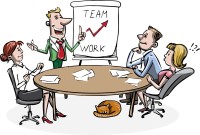- Home
- Business Processes
- Industry Knowledge
- Aerospace Industry
- Automotive Industry
- Banking Domain
- BFSI Industry
- Consumer/ FMCG Industry
- Chemicals Industry
- Engineering & Construction
- Energy Industry
- Education Domain
- Finance Domain
- Hospitality Domain
- Healthcare Industry
- Insurance Domain
- Retail Industry
- Travel and Tourism Domain
- Telecom Industry
- Leadership Skills
- eLearning
- Home
- Leadership
- Team Leadership
- Time Management Skills
Time Management Skills
How often do you have a plan for how you are going to spend your day but you aren't able to complete the tasks on your plan because of unimportant tasks, interruptions, or your own procrastination? Wouldn't it be great to be able to manage your schedule and your time while avoiding, or at least controlling, these time stealers? Learn the strategies to manage your schedule while still handling interruptions and demands on your time.
Meaning of Time
What time means to you and how to identify some of the ways in which you can manage it more effectively?
If you wish to become an effective manager of time you must first understand the nature of what you are attempting to manage. Time in this context is not to be defined philosophically. Most simply, it is of finite duration distinct from eternity. The expression 'time' in the English language as well as in other languages is used in different ways. Spend a few minutes writing down some ideas of what the following phrases mean to you:
- At the same time
- On-time
- Time off
- At times
- From time to time
- Timeless
- In no time
- Timely
- In time
A reflection on the above phrases will enable you to focus on the nuances of meaning that underpin their use in actual contexts. You have probably now got a clearer idea of time. Time in fact is an intangible concept or a paradox. You never have enough time but you have all the time that is available. It is a resource, but if you don't use it, it will disappear and you will never be able to catch hold of it, once gone. You can't increase its quantity, but you can ensure that you use it on things that are important to you.
You might have realized that time is a personal concept which means there is no right or wrong perception of time. Learning to manage time requires commitment and depends on how you approach various activities. Your approach will be influenced by the assumption you make about the nature of your work and the environment in which you live and work. Some assumptions will generally be more useful than others for managing your time effectively.
Meaning of Time Management
One of the most essential skills required by an effective manager and every professional relates to managing the time available and prioritize the long term and short-term goals.
Time management is a process of determining the quality and quantity of work output i.e. the effective utilization of time in performing various activities in the organization. Time management is the discipline of organizing, allocating, and controlling the time you use for activities in such a way that you achieve your desired results.
You as an employee have to perform your activities according to your job description. Your important duty is to see that all the activities are performed as per the job description and with the time limit assigned to the job. Time management will help you to perform your job more effectively and efficiently.
The flow of Time is Unidirectional
Like other resources, 'time' is also an important resource that has got a unique character of having a constant unidirectional forward flow. Time passed, cannot be regenerated nor it can be stored to be utilized later on when needed.
Adequate input of all other resources does not necessarily guarantee achievement up to expectation, if during the planning and implementing all possible efforts were not undertaken to complete the various component tasks in targeted time by effectively utilizing the same.
Why Time Management?
Time management is the discipline of organizing, allocating, and controlling the time you use for activities in such a way that you achieve your desired results. Time is a very valuable resource. The first step towards improving time utilization is to determine how available time is spent on different types of activities. Although managers understand that time is their scarcest resource, few actually take time to get a ‘birds-eye’ view of how they actually spend their time and keep a track of how the priorities they say are the most important fit with the actual way they spend their time. It highlights how to control your time so that you can optimize your productivity. Time management helps us to:
- To provide quality time to your responsibilities
- To decrease expenses through work transformation
- To see that all the staff spends their time as per the activities listed in their job description
- To measure the work output and facilitate quality customer focus
Time management is simply a way of using time effectively. Working faster or working longer are poor strategies for managing time. It is more sensible to identify your priorities and then choose the activities accordingly. In fact managing time is about managing yourself. It is about adapting to a given situation so that you can get the most out of your time for you to do this, you must accept that you can influence and ultimately control the environment in which you live and work. You must learn to spend your time wisely.
Related Links
You May Also Like
-
Evidence of the medically damaging symptoms of work stress necessitates applying the treatment of stress management. Stress management is increasingly drawing the attention to the management experts not only as a remedial measure but also as a way to resource management. If the workplace can be made a little more lovable the increase in the achievement of the organization may be much time more. If group stress can be removed by introducing group discussions and recreational facilities a long-lasting team spirit may get developed.
-
Facilitative Leadership is all about involving the employees in the decision-making process at all levels enhancing their sense of ownership, responsibility, and motivation. Facilitative leadership style uses a number of indirect communication patterns to help the group reach consensus and build commitment for the decision taken. To be effective in modern organizations, managers need to become facilitative leaders, learn what it means to be a one.
-
A good leadership style is something that every effective leader must have in order to succeed, but identifying what that entails or does not entails might be difficult to understand. Most of the research on leadership focuses on the exemplary, best practices, and positive attributes of effective and successful leaders. This article talks about a new approach to learn leadership using lessons from bad leadership. That is the lessons to be learned by examining leaders who have not effectively exercised their power, authority, or influence.
-
Building Perfect Creative Team
One misconception around creativity is that creative act is essentially solitary. Most of the world's important inventions resulted not from the work of one lone genius, but from collaboration of a team with complementary skills. Managers should build teams with the ideal mix of traits to form a creative group and then establish the conditions that make creativity much more likely to occur.
-
Generating Ideas using SCAMPER
SCAMPER is an activity-based thinking process that can be performed by Cooperative learning. SCAMPER is an acronym that provides a structured way of assisting students to think out of the box and enhance their knowledge. This can be used in the organizational context as a technique for creative problem solving and as a toolkit to generate fresh ideas.
-
Change & Culture of Innovation
Predicting the future is a tricky business but managers need to have a future perspective in order to take business advantage and remain competitive. They need to drive and introduce constructive change to the business of the enterprise. The first step to creativity and innovation is to drive a culture of Innovation. Managers need to focus on developing future mindset all the time to keep pace with the unfolding future.
-
Teams are part of the modern organizational culture. Whether you are a team leader or a team member, having a better understanding of how teams work, and being able to identify where the team is in the process, is a critical part of ensuring the team is ultimately successful. Start with the basics and understand what a team is and what role they play in an organization.
-
Concept & Definition of Stress
Stress is a popular expression used by people in day to day life. Pressures of day to day living sometimes necessitate coping or dealing with them and stretch the body beyond its natural capacity. They are called stressors. Stress is a natural, ongoing dynamic, and interactive process that takes place as people adjust to their environment.
-
Teams are certainly very relevant and important elements in today’s high-performance organization but the important thing to remember as a leader is that we can’t simply rely on putting highly effective individuals together to make a highly effective team. Empowerment increases the effectiveness of the team and drives many intangible benefits both for the organization and the employees.
-
Effective Business Communication
Communication is all about getting the message across correctly. To make this happen, you need to have good speaking skills and good writing skills. If you have these skills coupled with good listening skills and interest in reading, you have all the potential to be a good communicator. What things should the leader take into consideration to be more effective with interpersonal communication?
Explore Our Free Training Articles or
Sign Up to Start With Our eLearning Courses

About Us
Learning
© 2023 TechnoFunc, All Rights Reserved










